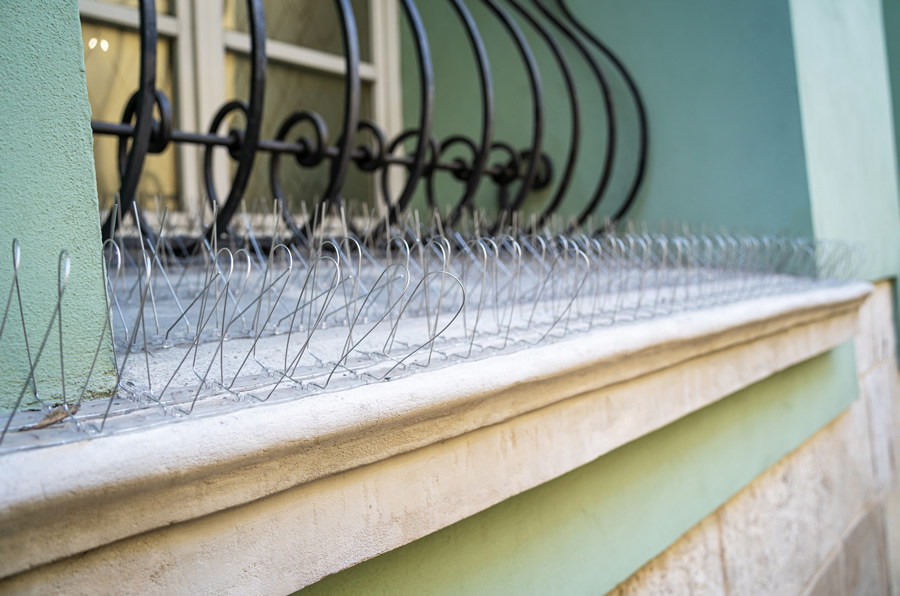Pigeons, often referred to as “rats with wings,” can quickly become a nuisance when they invade your property. These feathered intruders are not only messy but can also pose health risks and damage your property. In this comprehensive guide, we will explore the world of pigeon deterrents and how you can effectively keep these pesky birds at bay.

Understanding the Pigeon Problem
Pigeons are highly adaptable birds that thrive in urban environments. They are attracted to places where they can find food and shelter, making buildings and rooftops their ideal nesting spots. Before delving into pigeon deterrents, let’s understand why it’s crucial to address this issue.
Health Hazards Associated with Pigeons
Pigeons are known to carry various diseases, including Salmonella and E. coli, which can be transmitted to humans through their droppings and feathers. These health hazards make it imperative to keep pigeons away from your property.
Property Damage Caused by Pigeons
Pigeon droppings are not just unsightly; they can also cause extensive damage to your property. The acidic nature of their droppings can corrode building materials, leading to costly repairs.
Types of Pigeon Deterrents
Now that we’ve established the importance of pigeon control, let’s explore various pigeon deterrents that can help you reclaim your property.
1. Physical Barriers
Bird Spikes
Bird spikes are an effective physical deterrent placed on ledges, windowsills, and rooftops to prevent pigeons from landing. These spikes make it uncomfortable for pigeons to perch, forcing them to seek alternative roosting spots.
Bird Netting
Bird netting is a humane and long-lasting solution. It creates a physical barrier that prevents pigeons from accessing specific areas. Bird netting is commonly used to protect gardens and open spaces from pigeon infestations.
2. Visual Deterrents
Reflective Tape
Reflective tape, when hung strategically, can deter pigeons by creating flashes of light and movement that mimic potential threats. Pigeons are easily startled by these visual deterrents.
Predator Decoys
Placing predator decoys like plastic owls or hawks on your property can intimidate pigeons, making them think twice before landing. However, it’s essential to move these decoys periodically to maintain their Pigeon deterrents effectiveness.
3. Sound Deterrents
Ultrasonic Devices
Ultrasonic devices emit high-frequency sounds that are unpleasant for pigeons but generally undetectable to humans. These devices can be an excellent option for large areas.
Sonic Repellents
Sonic repellents produce loud, startling noises that deter pigeons from roosting. They are ideal for enclosed spaces like warehouses and garages.
4. Chemical Deterrents
Avian Gel
Avian gel is a non-toxic, sticky substance that makes surfaces uncomfortable for pigeons to land on. This deterrent is particularly useful for ledges and signage.
Bird Repellent Spray
Bird repellent sprays use natural ingredients to deter pigeons from landing on treated surfaces. They are safe for the environment and humans.
Choosing the Right Deterrent
Selecting the most effective pigeon deterrent for your property depends on various factors, including the location, the extent of the infestation, and your budget. It’s often advisable to consult with a pest control professional to determine the best approach.
Maintaining Your Deterrents
Once you’ve implemented pigeon deterrents, regular maintenance is essential to ensure their continued effectiveness. Clean surfaces, replace damaged deterrents, and reposition visual and sound deterrents periodically to keep pigeons guessing.
Conclusion
In the battle against pigeons invading your property, knowledge is your greatest weapon. By understanding the various pigeon deterrent options available and their respective advantages, you can take proactive steps to protect your property, health, and peace of mind. Remember that a well-chosen pigeon deterrent not only keeps these pests at bay but also ensures your property remains pigeon-free for years to come.
